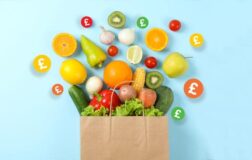25 supermarket money saving tips
Food might be an unavoidable expense, but spending a fortune at the supermarket is (thankfully) very avoidable – especially with these budget food shopping tips.
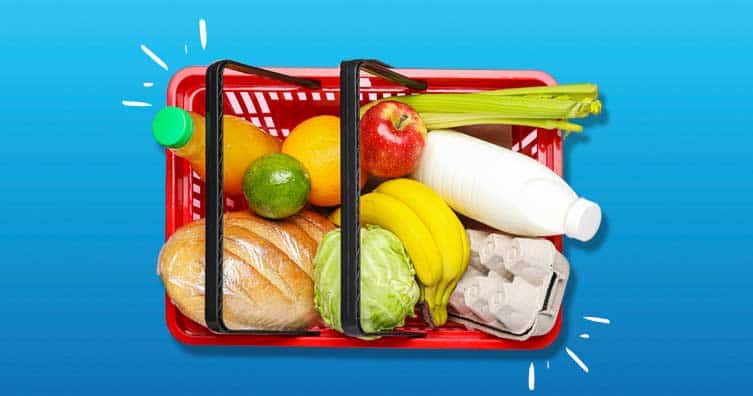
Credit: Pixel-Shot, Rasendria – Shutterstock
Supermarket shopping can often end with you shelling out a lot more cash than you expected.
But, if you're a bit smarter with your shopping, you'll find that you can live a life of (relative) luxury and eat like a king on a shoestring budget.
If you're struggling to eat well on a budget, we have years of supermarket bargain-hunting experience that can help. Simply by changing your food shopping habits, you could save hundreds of pounds every year.
How to save money on food shopping
Here are some tips on how to save money at the supermarket:
-
Find the best times to go food shopping

Credit: samritk – Shutterstock
For the best bargains, you should try to go shopping later in the day. It's best to go an hour or so before closing time, or at about 7pm in 24-hour stores. In fact, one shopping ninja mum previously put together a list of the best times to shop for reduced food.
All the items that go out of date the following day will be heavily reduced. The shop just wants to get rid of them before they have to be thrown away, so look out for the yellow 'reduced' stickers.
Once you've found a bargain, make the most of reduced food items by freezing as much as you can to eat them at a later date. Also, check out our tips for using food that's past its best. And remember that best-before dates aren't set in stone.
On the topic of reduced grub, try Approved Food. This website stocks clearance food (that is still perfectly safe to sell) from major supermarkets. Loads of products on there are going for less than £1!
-
Use supermarket cashback apps
With supermarket cashback apps, you can be reimbursed for up to 100% of the cost of some food and drink items at the supermarket.
One of our top picks is Shopmium. It gives you a sign-up bonus of 100% cashback on a nice treat (previous examples have included Nutella and Ben & Jerry's ice cream). Plus, you get £3 credit for referring a friend.
Before heading out to do your food shopping, check on cashback apps to see if there are any products on there that you need. If you're planning to buy similar things anyway, you can save yourself some money by getting cashback.
-
Use supermarket student discounts and deals on your food shop
The internet is filled with deals and vouchers for pretty much every store that you can think of. Before you head out to do your shopping, look in our student deals section to see what you can find in our daily-updated collection.
We have loads of online deals, as well as offers that involve printing vouchers for use in-store.
But don't get too carried away with wanting to use all the vouchers that are available. Use your common sense. If tins of tuna are less than half price, but you don't like fish, it's not exactly a saving, is it?
And don't forget about supermarket student discounts. With the Student Club scheme at Morrisons, you can get exclusive discounts and offers. Co-op also offers 10% off to students with a TOTUM card.
-
Shop the world food aisle
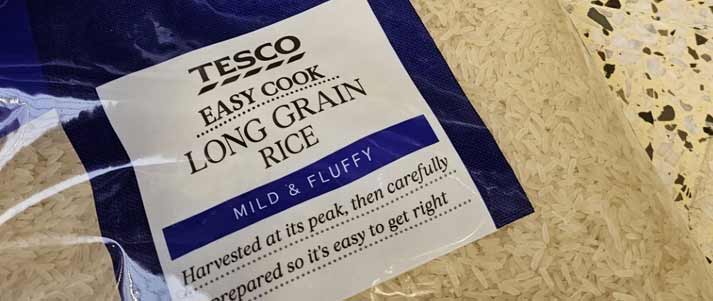
For cupboard staples like rice, spices and sauces, head to the world food aisle. This is one of the best ways to save money on food shopping. Items can be up to 75% cheaper than domestic equivalents.
It's not that the quality is any worse (in fact, it's often more authentic!). The only reason for the price difference is down to the brands not being as popular or well-known.
-
Plan your meals before going to the supermarket
When it comes to saving money at the supermarket, shopping lists are key. Making a weekly meal plan before food shopping will help you cut costs.
You'll be able to stay focused on the foods you really need at the shop. Plus, it will be easier to keep track of what you're spending each week.
It also prevents you from filling your kitchen cupboards with three of the same thing because you'll know what you do and don't need.
-
Scan your receipts to get vouchers
Is your wallet bulging with receipts? Good! Those receipts could help fund your next online shopping spree.
There are plenty of apps that will reward you for scanning your receipts. The good news is that you're usually able to scan the same receipt into multiple apps. In other words, you can get double the rewards (or more) for just one shop.
But, before you get your hopes too high, bear in mind that the payout per receipt is fairly small. You'll have to scan between 50 and a few hundred receipts before you can get a £5 Amazon voucher. But, scanning them doesn't take much time. And since you'll be doing the shopping anyway, it's literally free money.
-
Always check the reduced section
The reduced section of supermarkets isn't just for food that's approaching its best-before date.
You'll likely be able to find a range of things there, such as products with damaged packaging or other minor faults. Whatever the issue, if you see the yellow sticker, there's a bargain waiting to be snapped up.
This corner of the supermarket is usually best stocked towards the end of the day (when the 'best-before date' food migrates over). However, there will almost always be something on the shelves, no matter when you shop. Yellow stickers galore.
-
Avoid wasting food
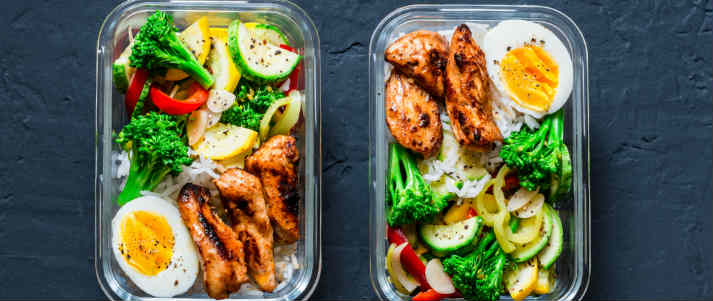
Credit: Kiian Oksana – Shutterstock
This probably goes without saying, but it's surprising how many students (or people in general) let leftovers or food in their fridge go off.
If you're just not in the mood for that chicken salad for the third night in a row, you have options. Instead of throwing it away, experiment by adding something new to it, or taking the chicken pieces out and using them for a pasta sauce.
Plenty of foods are also good to eat after the best-before date has passed. Plus, there are loads of resources online for using up leftover food. For example, BigOven is one of our favourite apps for students as it shows you recipes for your leftovers.
If you've got a bit of a surplus of food for the whole week, check out our list of foods you never knew you could freeze.
And we have plenty of tips on making the most of foods that are losing their freshness.
-
Get leftover food on Olio and Too Good To Go
It's easy for us to tell you what to do if you buy/cook more than you need, but what if you've not got enough? If you ever find yourself in that situation, head straight to Olio and Too Good To Go.
These apps are marketplaces for getting rid of excess food. While Olio is home to individuals with something to give away, Too Good To Go lets restaurants and cafes sell their additional stock at a knockdown price.
If you've got nothing in for dinner, check the apps before heading to the supermarket (or worse, the takeaway menu).
-
Buy seasonal fruit and vegetables
When planning your meals for the week, think about what food is in season.
Produce that's in season should have travelled fewer food miles. This means that buying seasonal food can help you reduce your carbon footprint, and it will likely work out cheaper than something that's been shipped from the other side of the world.
And, as a general rule, avoid paying for any pre-packaged fruit and veg. The plastic coverings only add to the price and aren't as good for the environment.
-
Buy supermarket own-brand products
It's easy to get into the habit of sticking to particular brands that we know and trust. But, if you are yet to discover the beauty of cheap own-brand products, get ready. It's one of our favourite budget food shopping tips.
For many branded foods, the contents are extremely similar to supermarket own-brand alternatives. In some cases, they're even better. The only difference is the packaging and (sometimes ludicrous) price gap.
Set yourself a bit of a challenge, and next time you go shopping, only buy the supermarket's own-name brands. You could save a huge chunk of money, and we're pretty confident you won't notice much difference in taste.
We have a whole guide on how to go about the shift to own-brand products.
-
Never shop for food when hungry
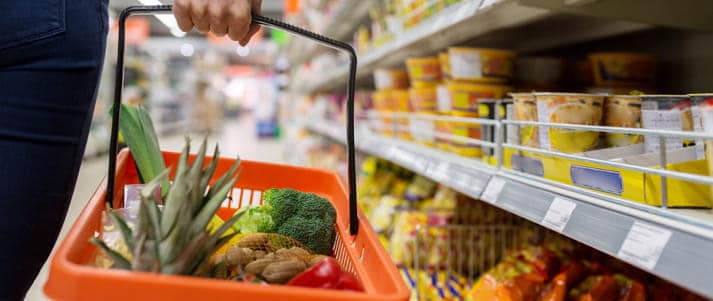
You've probably heard this countless times before, but how often have you broken the golden rule and spent too much on tempting snacks?If you haven't eaten all day and then head to the supermarket, you may end up throwing anything and everything into your trolley. Have a bite to eat before you go food shopping to avoid hunger-fuelled impulse buys.
-
Do your food shop online
Doing your food shopping online is one of the best ways to cut your spending. Most major supermarkets allow you to order online, and some have discount codes that will get you some cash off your cart.
Shopping online also protects you from the dangers of being tempted by fancy product displays in stores. And this way, the smells wafting from the in-house bakery won't be able to persuade you into buying the entire cake selection.
It's also easier to compare product prices online, as you can access the prices of products at other major supermarkets. And, when comparing costs, check the price per kg to ensure you're getting the most out of your money.
For more details on how shopping online can save you cash, as well as which supermarkets to choose, see our guide to online food shopping.
Alternatively, if you're in a rush to receive your groceries, you could try these apps for same-day delivery.
-
Squeeze the most out of loyalty cards
Most supermarkets offer a loyalty scheme. With these, you can collect points on your shop that can then be redeemed against future purchases.
We'd recommend getting a loyalty card from all supermarkets in your area that offer them. The key to saving is not letting loyalty cards dictate how and where you shop.
When you sign up for a loyalty card, they'll gather information on the type of products that you typically buy. To persuade you to visit their stores more, they'll often send you vouchers that they think you might use.
But remember – only use the voucher if you really need the products they're offering! Most vouchers are valid for ages, so start collecting them all together in a safe place and use them as and when they're needed.
-
Become a flexitarian
Meat eaters, bear with us for a minute, please! If you're a vegetarian or vegan, you'll already know how much cheaper your food bill can be by cutting out meat.
Ditching the meat for just a few days every week can save you a tonne of cash. There are loads of great veggie recipes to try, and you'll still get to eat meat sometimes. It's a matter of mixing things up a bit.
It also means you'll start appreciating meat more when you don't expect to have it every day.
-
Buy food in bulk

If you live in shared accommodation, think about food shopping with your flatmates. Since buying in bulk is often cheaper, you could save money if you pool your cash for certain items.
For example, buying toilet paper in bulk and splitting the cost is more effective than you each separately buying a two-pack.
Make sure you do the maths before buying in bulk, though. Sometimes you'll find that you're not actually getting a better deal, despite what the supermarket would like you to think. And on that note...
-
Be wary of bad supermarket deals
From time to time, some of the deals you'll see during your food shop will seem too good to be true... and that's because they sometimes are.
Stay on your toes and calculate the savings of so-called "special offers". Don't just trust the brightly coloured discount signs that are designed to make you think you've found a bargain. Your phone comes with a calculator, so there's no excuse for being fooled.
Want to learn more? Check out our guide that exposes common tricks used by supermarkets to get you to spend more.
-
Compare prices before shopping
Prices seem to constantly change, so how do you know where to get the best deal? Check out Trolley. This website (and app) lets you compare the prices of your favourite products from most UK supermarkets and organise your shopping list by where's cheapest.
Most of the prices listed are from online stores, but this is often similar to the in-store prices. You can even set up price alerts for your favourite items.
-
Shop at budget supermarkets
When it comes to food shopping, we tend to be creatures of habit. Many of us will be tempted to go to whichever supermarket is closest (even if it's a Tesco Metro with crazy markups).
To guarantee you're making the best savings possible, shake things up a little bit. Cheap supermarkets such as Lidl and Aldi offer some brilliant deals for those who are willing to venture out of their comfort zones.
The same goes for shopping at local food markets, as well as other small or independent stores. Shop around and you'll save some serious cash.
-
Don't shop on payday
Shopping as soon as your Student Loan or salary hits your student bank account is a recipe for disaster.
When you receive the money, you might feel like you're swimming in an endless pool of gold, but your loan will run out quicker than you think. Next thing you know, you'll be running to the bank of Mum and Dad for money and buying baked beans until your next instalment.
-
Grow your own food
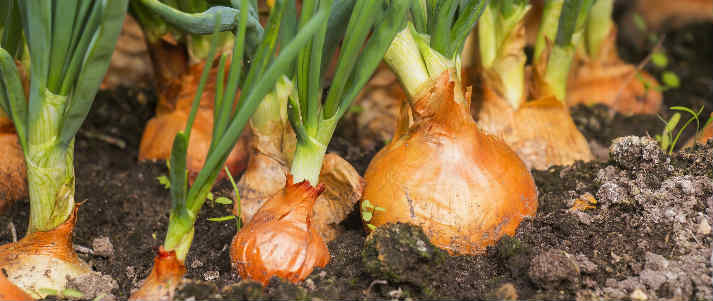
Credit: Inga Gedrovicha – Shutterstock
Reduce your need for supermarkets by growing some food of your own. You don't even need to have a nice garden to grow things like cress or potatoes. A window box, indoor pot or upcycled bin will do nicely. It's easier than you might think.
Not only does growing your own fruit, veg and herbs save you money, but it also gives you a smug sense of self-satisfaction.
-
Have a frugal day each week
If you're looking to save some serious cash, it's worth having one or two super frugal days a week.
On these days, try to eat as cheaply as possible (but still healthily if you can) with meals based on grains and veg.
Sure, tomato pasta can be a bit dull, but having it for lunch and dinner one day a week can save you money. Plus, you've always got the next day's meals to look forward to.
-
Cook meals from scratch
It might be tempting to buy that ready-made carbonara from the supermarket. But it will work out so much cheaper to buy the ingredients and make it from scratch.
If you're lacking a bit of culinary confidence, try these essential cooking tips. They'll make life in the kitchen a breeze.
Get stocked up on your kitchen cupboard essentials, then head to our recipe section for some inspiration for meals.
-
Send back poor-quality food
Ever noticed those messages on the back of products that say that if you're not happy with something, you can send it back? We bet you've never actually tried it.
But, if you're less than impressed with your latest soup or chocolate spread, you could consider sending it back and telling them why.
The address is normally Freepost. If you include an explanation and your receipt, the manufacturers are likely to send you a refund or a freebie to console you.
-
Treat yourself
And, to end on a nice note, it's always good to treat yourself to a few nice things on occasion.
If you factor a few treats into your shopping list, you're less likely to splurge on tempting special offers when in the store or later in the week when you're craving chocolate. Well, that's the theory anyway...
Want to cut down your spending even further? We've got plenty more tips for saving money on food in our guide.

